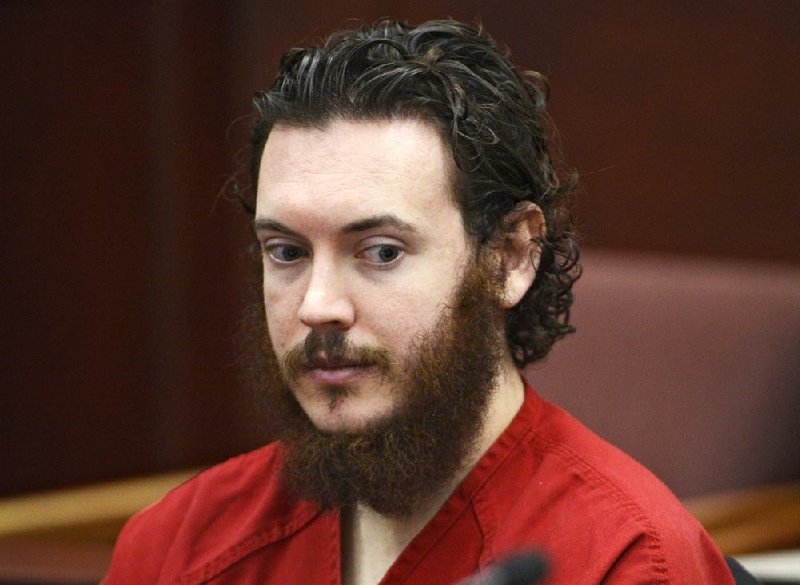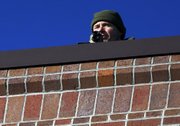CENTENNIAL, Colo. -- Theater shooting defendant James Holmes sat quietly and leaned back in his chair in court on Tuesday just hours before the start of the arduous process of choosing the jurors who will decide whether he was sane when he opened fire in a packed Colorado movie theater.
Jury selection began Tuesday for the trial of the former graduate student who, his attorneys acknowledge, opened fire during a midnight showing of a movie in 2012, killing 12 people and wounding 70 others.
Court officials initially summoned a jury pool of 9,000 people, the largest in the nation's history. But that figure later fell to 7,000 after some summonses could not be delivered and some people were excused. The pool will be winnowed to a handful in the weeks ahead.
It could take until June to seat the jurors and alternates for a trial that might last until October.
Holmes, who has pleaded innocent by reason of insanity to murder and attempted-murder charges, could get the death penalty if convicted.
The first wave of jurors arrived in court after undergoing two security screenings. They heard instructions from the judge before they filled out questionnaires.
Judge Carlos Samour suggested earlier that attorneys might not have to screen all the prospective jurors before beginning to select panelists. He said the process could stop after a few thousand people are screened if both sides agree they have a large enough pool of people.
The defense objected to the use of a video during the trial, saying prosecutors gave it to them too late. The video is apparently from the jail where Holmes has been held, but its contents have not been made public.
The judge also went over ground rules for jury selection and the trial, urging attorneys on both sides to be professional and respectful.
"We're going to be spending a lot of time together," Samour said.
The scope of jury selection and the trial are testaments to the logistical hurdles of trying the rare case of a mass shooter who survives his attack.
"The public is going to get an insight into the mind of a killer who says he doesn't know right from wrong," said Alan Tuerkheimer, a Chicago-based jury consultant. "It is really rare. It just doesn't usually come to this."
Shortly before 1 p.m., prospective jurors began walking into the courtroom. Some carried books or newspapers or looked at their cellphones as they waited to pass through a security station in the hallway.
The case has sparked an emotionally charged debate, with Holmes' parents begging for a plea deal that would save his life, while many survivors and family members of victims have demanded that he be executed.
After the July 20, 2012, shooting, Holmes was arrested as he stripped off combat gear in the parking lot of the Century 16 movie theater in Aurora, a Denver suburb.
If jurors convict him, they must then decide whether to recommend the death penalty. If Holmes is acquitted, he would be committed to the state mental hospital indefinitely.
Defense attorneys acknowledge Holmes, 27, was the gunman in the attack but said he was in the grip of a psychotic episode at the time.
Under Colorado law, defendants are not legally liable for their acts if their minds are so "diseased" that they cannot distinguish right from wrong. Part of the reason the case has dragged on is the battle over whether that standard applies to Holmes.
Few details on those arguments have been made public. Prosecutors and defense attorneys remain under a long-running gag order, and court documents detailing the issue have stayed under seal.
Holmes' sanity was evaluated by a state psychiatrist but the results were not made public. Prosecutors objected to the findings and persuaded a judge to order a second evaluation. Those results were contested by the defense.
Prosecutors previously rejected at least one plea deal proposed by Holmes' attorneys, criticizing the lawyers for publicizing the offer and calling it a ploy meant to draw the public and the judge into what should be private plea negotiations.
Survivors of the attack and family members of victims have had a long time to get ready for a trial.
"We've all been to therapists and have talked to our families and have our support groups, so we're prepared," said Marcus Weaver, who was shot in the arm and whose friend Rebecca Wingo died in the attack. "It's going to be quite the journey."
Samour called nearly nine times as many prospective jurors as were summoned in the ongoing Boston marathon bombing trial. That meant the county's 600,000 residents had a nearly 1-in-50 chance of being selected.
A Section on 01/21/2015


